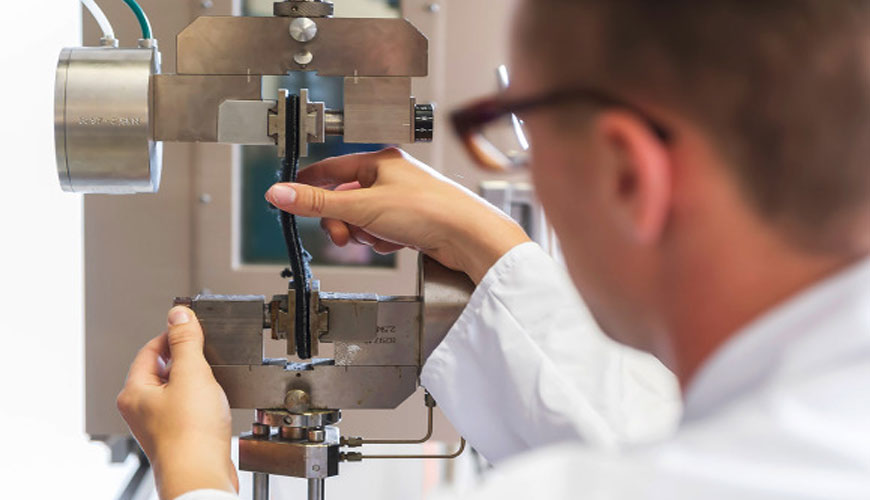

EUROLAB, with its state-of-the-art accredited laboratories and expert team, provides precise and fast testing services within the scope of EN ISO 5893 testing. This standard specifies requirements for tensile testing systems operating at a constant traverse rate and suitable for testing rubber, plastics and adhesives, although any system can only be applied to a narrower range of materials. It also covers such systems when used for bending, shear and compression tests.

The size and construction of the machine shall be such that it can test all the materials it is intended to be used in and shall have no features that would adversely affect the test results.
The movable handle must be able to cover a sufficient distance to accommodate the maximum elongation of the test piece. For more extensible materials, a transition distance of more than 1 m may be required.
The connection between the force measuring system and the test piece jaws or apparatus must be precisely aligned with the strain axis. When in place, the test piece must also be exactly aligned with the strain axis and the test axis of the test piece should coincide with the direction of the applied force.
For testing tensile test pieces of flexible materials such as dumbbells, parallel strips and similar, the machine must be equipped with a type of grip that closes automatically as tension increases (e.g. wedge or pneumatic) and exerts an even pressure throughout. Screw jaws are also suitable for hard materials. The test piece should be held in such a way that slipping relative to the jaws is prevented as much as possible.
Machine stiffness (also called stiffness) is the ratio between the force and the deflection of the test system. This includes the frame of the machine, the strain applying mechanism, the force measuring device, and the grips and attachments in which the test piece is held.
The long-term stability of electronic testing machines is affected by a number of factors, the most important of which are temperature, mechanical hysteresis in the force sensing element, susceptibility to mains supply voltage fluctuations, and change in electronic component value.
Therefore, the manufacturer must specify in his specifications and any instruction manual the following requirements that may be necessary to maintain the specified accuracy of the machine:
EUROLAB assists manufacturers with EN ISO 5893 test compliance. Our test experts, with their professional working mission and principles, provide you, our manufacturers and suppliers, the best service and controlled testing process in our laboratories. Thanks to these services, businesses receive more effective, high-performance and quality testing services and provide safe, fast and uninterrupted service to their customers.
To get an appointment, to get more detailed information or to request an evaluation, you can ask us to fill in our form and reach you.